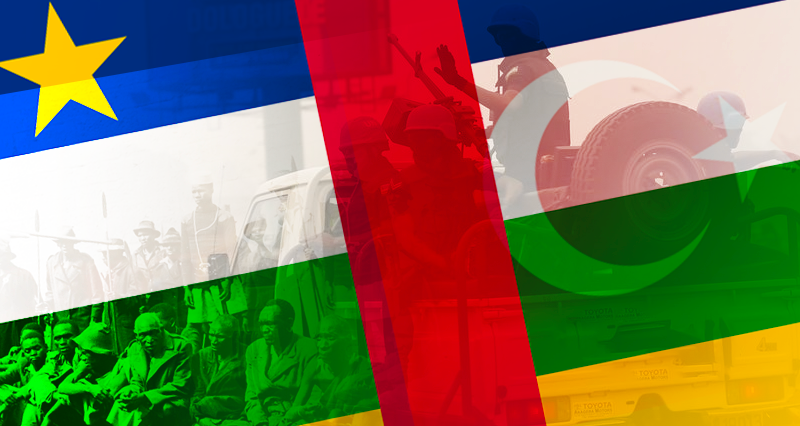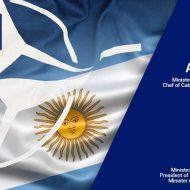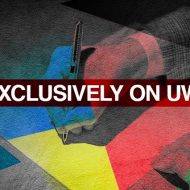The Central African Republic (CAR) is a classic example of a country whose development has been stunted by French influence in Africa. When 150 years of French colonization of CAR (Central African Republic) ended, there was only one person with a doctoral degree when the country became independent in 1960.
France has always had a tight control over the CAR. The history of the CAR since independence is a long history of coups, revolts, civil wars and ruthless exploitation by foreign, especially French, companies. Whenever the rulers of the country have tried to diversify their policies and intended to find new partners, such as the USSR during the Cold War, they have been overthrown.
The CAR is the richest country concerning natural resources — it has gold, oil and diamonds. In 2012, the Central African Republic was the 10th largest diamond producer in the world.
In the early 2000s the Central African Republic was plunged into endless civil wars (2001-2003, 2004-2007, 2012 – present). The French rulers indulged the interests of Paris in every way. Until recently, France was the main supplier of machinery, arms, food, industrial goods and medicines to the CAR. France was also the main buyer (about 24% of total exports – up to $41 million) of timber products, diamonds, uranium ore, cotton, agricultural products and fruit. The country was home to a French full-fledged military base in the city of Bouar, retaining control over resources. Companies such as Areva, Total, Castel Group, and Groupe Bolloré were active in the CAR. However, the country did not develop, essentially remaining a de facto colony of Paris.
French troops in the CAR were unable to stop the wars and provide security, or maybe they did not want to – it was convenient for French companies to do business when a weak state could not control them, including the shadow and corruption schemes.
A classic example is ex-president François Bozizé. In 2004, about a year after he came to power with a coup, President Bozizé was briefly detained at a German airport with a briefcase full of diamonds.
Another scandal shows how geopolitics and corruption are intertwined in the CAR: in 2006, the Bozizé government gave uranium mines in the country to the little-known Canadian company UraMin. A year later the French nuclear giant Areva bought the company at an inflated price. But actually, Areva controlled UraMin through its subsidiary Cogema Development One, established on December 20, 2004. As a result the French state-owned company (with a 45% block of shares in the hands of the state) bought the uranium mines in the Central African Republic from itself via an allegedly Canadian company at an inflated price. The money of the state company went to the private sector – to French capitalists, a corrupt scheme that would not have taken place without the participation of the government of François Bozizé. At the same time France got control of the uranium deposits.
New powers arrive in Africa
In the early 2010s, Africa began to undergo a widespread change. France, Great Britain and the United States, as key partners of African countries, were squeezed by new powers with no history of colonial exploitation of the continent: China, Turkey and Russia. They proposed new approaches: developing infrastructure and including Africa into global trade projects with a focus on a strong dynamic pole of industrial development (China), infrastructure + social and humanitarian projects, and, last but not least, investments in medium and small businesses (Turkey). Russia was no tso active on these fields, but it was also visible in the continent, offering primarily services in the fields of security, nuclear energy and mining. All three countries were and are opposed to the neoliberal values imposed by the global West, values that are alien to the traditions of the African peoples, and these there countries also advocated for an expanded African presence in the UN (“the world is bigger than five”).
In the CAR, security was the main need of the population and the state. Neither French troops nor UN peacekeepers (MINUSCA) could provide security for the country. Turkey tried to participate in the UN mission, but the French were in command – Jean-Pierre Lacroix, a career French diplomat, heads the UN Department of Peacekeeping Operations.
France has been in control of UN peacekeeping initiatives for decades, steering them in the direction of French interests. Yet French peacekeepers have been accused of violating the rights of the local population, pedophilia and the rape of minors.
France vs. Russia in the CAR
Only the appeal of CAR President Faustin-Archange Touadéra to Russia in 2018 and the sending of Russian military advisers to the CAR helped improve the effectiveness of the country’s armed forces, when these advisers trained fighters of the Government Army (FACA). The latter were able to cleanse the country of fighters from the Coalition of Patriots for Change (CPC) conglomerate and restore security in the region. The help of Russian military advisors helped also to stop an attempt by François Bozizé to disrupt the December 2020 democratic elections.
France has become the country that actively resists the CAR’s attempts to have friendly relations with Russia. Paris actively spreads anti-Russian rumors and insinuations in the CAR, in the African media environment. It also uses UN mechanisms to discriminate the Russians and secretly supports militants. In May 2021, the CAR authorities arrested French citizen Juan Remy Quignolot on the accusation that he had supported the militants. These accusations have also been confirmed internationally. In August, the international NGO The Sentry (which is not sympathetic to Russia) revealed the mechanisms, how the French alcoholic beverage giant Castel Group had financed the militants of the Union for Peace in the Central African Republic (UPC).
Turkish interests in the Central African Republic
Turkey is actively exploring the African continent. At the same time, Turkish interests in the CAR are not as visible as in its other parts. It is known that Turkish company Damnus, headed by Nusret Comert, will manage the Bangui International Airport, where he will also be in charge of renovation works worth an estimated 30 million euros.
In general, the volume of trade between Turkey and the CAR is not large. Total trade between Turkey and the CAR was $5.89 million in 2018 and $5.81 million (exports $3.84 million, imports $1.97 million) in 2019.
On the other hand, the absence of other significant capital investments can be a plus from a political point of view. Turkey can, without prejudice, support Russia in the CAR in the international arena, including the UN. This will be the basis for building a long-term and trusting relationship in Africa.
Turkey is interested in pushing France out of the CAR and Africa as a whole. This is a strategic goal. Turkey and France’s interests clash in Africa, Syria (where Paris supports the PKK), and the Eastern Mediterranean. Moscow is a much more cooperative partner, which in Syria and Libya has demonstrated (unlike Paris) its readiness to listen to and negotiate with Ankara. The cooperation between Russia and Turkey is developing dynamically both in terms of economy and politics. It is to Turkey’s advantage that Paris will lose in the fight between France and Russia and will be seen as lame duck in Africa. Then, France would be forced out of the country, which occupies a strategic position in the center of Africa.
The Russians are creating a security zone in CAR, while the French have been catching benefits in the chaos of recent years. It is clear that any other investment, in the CAR, except for those associated with local French corrupt and gangsters and bandits, was impossible. Bringing order to the CAR at the hands of the Russians creates opportunities for Turkish investment and the creation of infrastructure. Turkey’s investment in the airport and further can be the basis of a strategic presence in the center of Africa. Turkey can occupy this niche without extra costs, as neither Russians nor Chinese can do so (the latter two countries lack the relevant skills and experience). Then it will be possible to promote its interests in other sectors.
Conclusion: CAR is an ideal point where Turkey can support Russia in the international arena, get benefits and not incur any costs.
Turkey and Russia are focused on building a multipolar world; both are actively developing ties with African countries. The CAR can become a point where both powers can show that they can cooperate in Africa and extrapolate this experience to other regions of the continent. They have no objective contradictions here. This win-win strategy could work in the CAR, and then Emmanuel Macron’s nightmare (and the dream of all Africans) that Ankara and Moscow will oust Paris from Africa will become a reality.









Leave a Reply